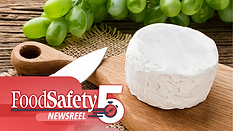
Dairy/Eggs
Dairy and eggs include pasteurized and raw animal milk and milk products, as well as shell eggs and egg products.
Articles
More ArticlesNever miss the latest news and trends driving the food safety industry
eNewsletter | Website | eMagazine
JOIN TODAY!Copyright ©2025. All Rights Reserved BNP Media.
Design, CMS, Hosting & Web Development :: ePublishing


